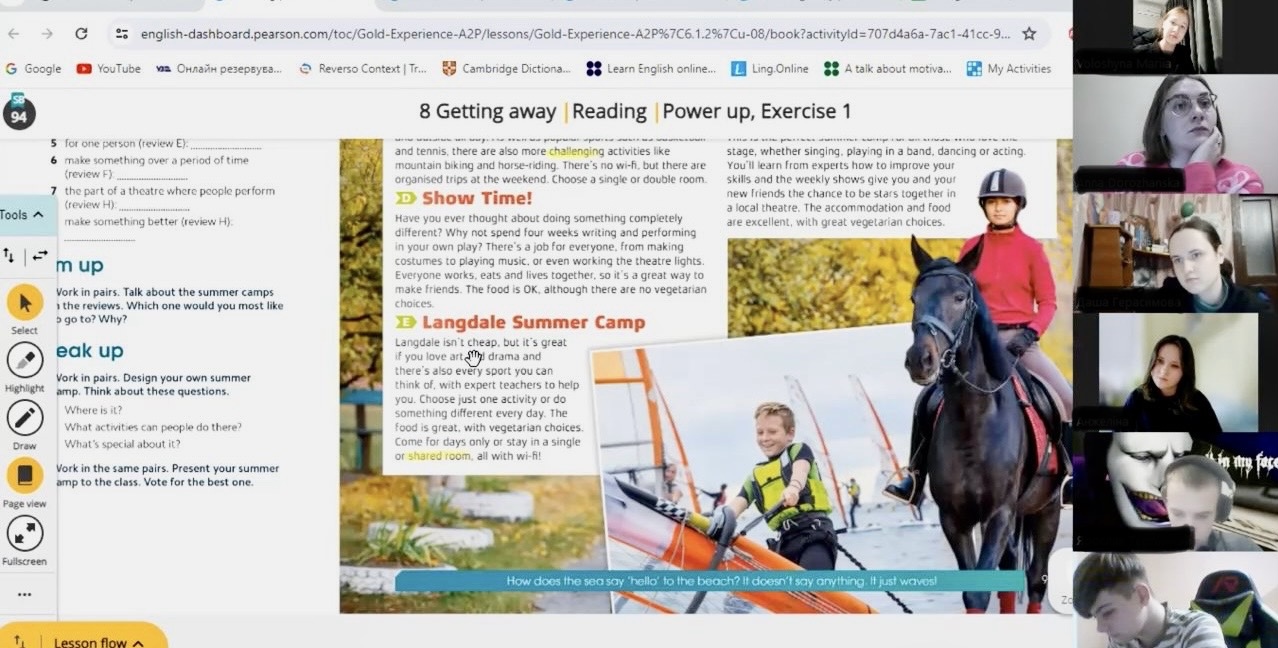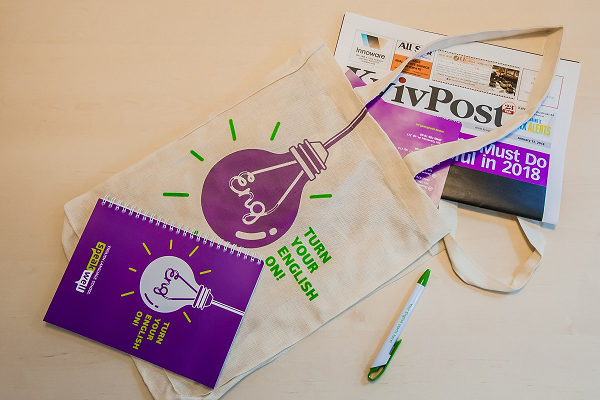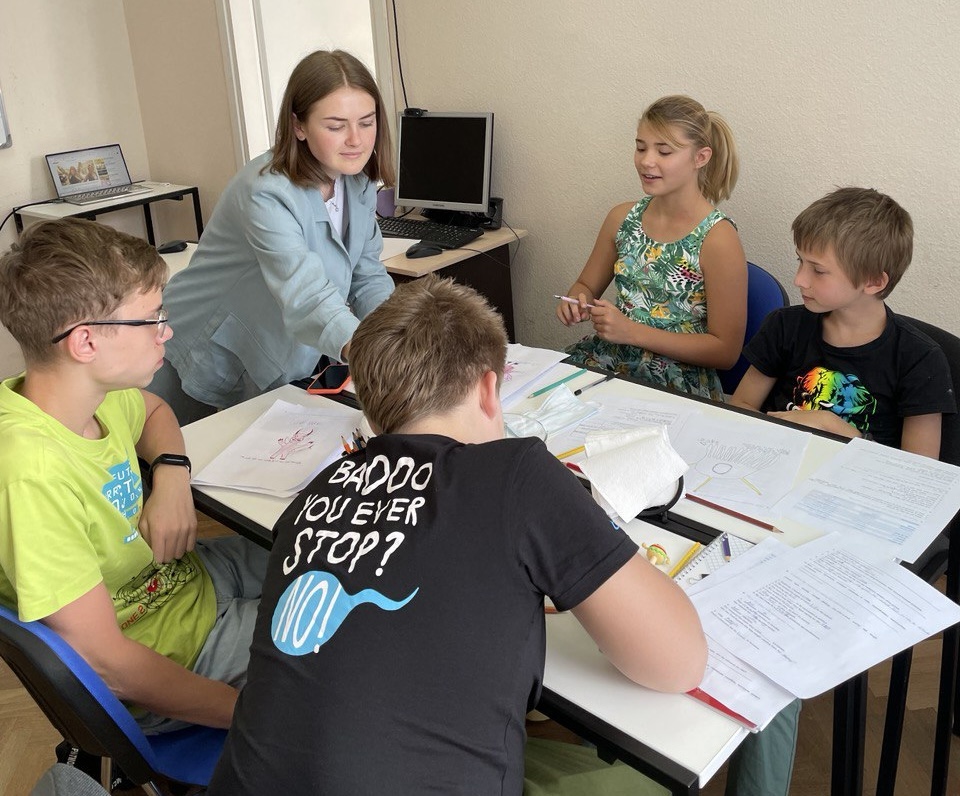
What's the problem?
Russia's full-scale war against Ukraine forced many Ukrainians to flee the country abroad, where their mother tongue wasn't enough for day-to-day life. The people's urge to learn a new language, especially English, has spiked. People used to study it only for work, travel, or education abroad, but English has become part of their survival kit.
Ukrainians, who are building their lives anew in new countries, have found the prices for learning services in the EU and beyond too steep for their budgets. Seeking online language schools and courses in Ukraine has become the preferred option — the country boasts numerous independent tutors, classes, and schools.
With the growing demand, Ukrainian teachers are pondering the questions of quality and supply. How can they teach the language exceptionally? How can they meet the students' needs? Some who are just starting their careers in education wonder what starting a language teaching business takes and what they should be prepared for.
What's the solution?
What consumer wants

Illustrative photo
Marta Markevych, a linguist turned English teacher for nearly four years, shares her journey. Starting in 2020 at a private education institution, she transitioned to freelance teaching within a year. During the COVID-19 pandemic and quarantine, she had to adapt to online teaching, which posed challenges for both students and instructors.
"At the time, I wasn't aware of interactive exercises or games for online classes and didn't know how to make online lessons engaging. It's much easier to figure this out nowadays because many courses and workshops on the subject are publicly available," Markevych shares.
According to Markevych, the demand for English learning among Ukrainians surged with the invasion as many people migrated abroad and felt the need to communicate in English. Observing this trend, she notes a significant demand for general English courses. IT English has also become popular.

Director of Speak Well School Network, Iryna Kravchuk
Iryna Kravchuk, the director of the Speak Well School, confirms that "survival English" is among the most sought-after courses. She also notes the high demand for exam prep for the IELTS language certification, which is crucial for studying abroad or searching for a job.
A prevalent request among corporate clients is business English for employees. Kravchuk notes a significant increase in demand from both state and private companies. Interestingly, Ukrainian as a foreign language is also on the rise. The school offers these services to employees of international companies, charities, and NGOs.
"Speak Well School has been in the market since 2010 and has experienced turbulent periods. However, the demand for English learning has always skyrocketed after crises and upheavals," Iryna Kravchuk shares. "From my experience, each year, more Ukrainians not only learn English and read with a dictionary on hand but genuinely master it at a confident, conversational level. This trend will continue to grow because English gives you communication freedom wherever you are."
Liubov Voloshniuk, owner of the British Hills English School, highlights a trend toward specialized courses over the past few years. Instead of universal courses aimed at overall language improvement, more people seek courses tailored to specific goals and needs. These include business English, IT English, military English, international test preparation, and conversational programs. There's also increased demand for preparing teenagers for international exams.
"Overall, Ukraine ranks 45th out of 113 countries in the 2023 EF English Proficiency Index. There's also an interesting statistic about the age group of students. Over the past 5–7 years, we've observed a rise in demand for English learning among people aged 31 and older and consumers aged 45 and above. This shows individuals' more conscious choice to plan their development," says Voloshniuk.
Secrets and strategies of successful teachers
Most schools and teachers resumed work shortly after Russia's full-scale war began. Some even expanded their services to neighboring countries, targeting primarily Ukrainian refugees. New online schools have also started to pop up.

English teacher Marta Markevych
"The competition is quite fierce because there are more and more teachers, but it's crucial to remember that students aren't just looking for a professional; they're also looking for a human. Every teacher has a unique personality, which helps them find students who are a good match," says English teacher Marta Markevych.
Marta believes that if a teacher has experience and certifications, and their lessons are well-liked by students, they're already at an advantage. She uses a communicative approach, currently the most common among teachers. She adapts each lesson to fit this method and uses textbooks to supplement classes with various interactive tasks.
"New students often come to me through word of mouth. I also run my own Instagram page, where I talk about teaching. It's important to build your personal brand and share your thoughts. Sometimes, I post on Facebook and get students from there, too. Facebook and Telegram have teacher groups where you can also find new students. For example, if a teacher can't take on a student, they can mention it in the group, and other teachers can step in," Marta explains.
Marta Markevych says that when you work solo, your workload varies. Some teachers are willing to teach 8–9 lessons daily, while others prefer 4–5. She finds that six lessons a day is her limit. Schools have more resources, but they also have a greater need to attract students.

Classes at Speak Well School, pre-war photo
The leader of Speak Well School, Iryna Kravchuk, shares that student demand dropped by about 30% at the beginning of the war, but two years after the invasion started, the school managed to return to pre-war levels. During this time, over 3,000 students attended their school, taking both individual and group lessons, with around 50 teachers.
"It's encouraging to see that students focus on quality now. The era of 'learn English in a week' is fading because people understand it doesn't work like that," says Iryna Kravchuk. "To get our name out there, we use a full range of marketing tools, including search engine optimization, contextual and targeted advertising, and social media promotion. However, most of our clients come from personal recommendations. So our students' success is our best form of promotion."
Iryna adds that language schools often offer extra incentives. For example, at "Speak Well," all additional clubs and events are free. You can pay for the introductory course and still have unlimited access to conversation clubs with native speakers, allowing you to immerse yourself in an English-speaking environment.

Online classes at British Hills English School
"British Hills" is a small to medium-sized English school that has tripled in size over the past two years. Since the war began, the school has operated only online but plans to start offline classes by September 2025.
"We're always working to improve our products and services," says the school's owner, Liubov Voloshniuk. "During the war, we've refined our learning programs, developed new courses, and improved customer service and student interaction. We've also created an effective online training system for new teachers. We have well-organized methodologists and online customer support."
Liubov believes that offering a unique product is key to attracting students. It needs to be helpful to the customer and distinct from what's available elsewhere. If all the schools offer similar courses, students will choose based on other factors: how they were treated, how quickly they received responses, where the service is more convenient, and where prices are lower.
Is now a good time to start teaching languages?

Illustrative photo
English teacher Marta Markevych offers an example: a one-on-one beginner teacher in Ukraine can earn about ₴200 to ₴250 ($5–6) per lesson. For experienced teachers, the starting rate is between ₴300 and ₴1,000 ($8–$25), or even higher.
"The price point depends on your experience, education, and English proficiency. If you consistently improve your skills, gain more certifications, and make your lessons engaging, you'll be able to charge more," Marta explains.
What do you need to start? It depends on your goals and ambitions. You could have a laptop and be a solo teacher with a simple business registration, or you could build a large team, develop a teaching philosophy, create a unique brand, and have a dedicated curriculum development department with a marketing team. Considering opening your language school, you must carefully weigh the pros and cons. Competition is intense, so it's best to enter the market with a compelling offer and a strong team.
"The key to business success is to stay on trend and adapt quickly to changes," says Speak Well School owner Iryna Kravchuk. "For instance, during the pandemic, you had to swiftly transition to online teaching and use new EdTech solutions like online platforms and other digital tools. The full-scale war also brought its own set of challenges. You can't just set up a teaching process in our business, and then leave it on autopilot and not evolve. You either accept the daily challenges or fall behind."
Iryna notes that many people with strong English skills, including teachers, have left the country, so language schools and courses are not only competing for students but also for teachers. This demand means it's a great time to land a good teaching job with attractive benefits and decent pay.
"We're constantly looking for English teachers. I think there's also a high demand for teachers of other languages," British Hills leader Liubov Voloshniuk says. "Despite the tough competition, we experience a shortage of qualified specialists. Schools address this by collaborating with university students and graduates. They support young teachers through internships and training and teach them new approaches, easing the staffing issue."

Liubov Voloshniuk, owner of British Hills English School
"I opened my own English school in 2014 when Ukraine was going through economic and political instability. It was a personal challenge for me," says Voloshniuk, owner of "British Hills." "Back then, most teaching was offline, and you needed significant financial resources for office space, furniture, equipment, textbooks, program development, website creation and promotion, and marketing materials like brochures for schools and business centers."
Because offline teaching means attracting students from a specific location, choosing the right spot for your language school is crucial and can influence your overall success. Before deciding, you had to consider many factors, but things have changed a lot in the language learning industry in the past ten years.
What's different? There's a mix of online and offline learning, with more players in the market: large networks, smaller schools, and individual tutors. These offer a broader range of courses and prices and use interactive learning platforms. Artificial intelligence is also on the rise.
"Getting into the market today is faster and more accessible, but it also requires additional skills and knowledge," says Voloshniuk. "If you're a private tutor, you need a high level of English proficiency, an understanding of course creation, and a command of interactive platforms. You also need to promote your services on social media to attract clients and create quality content. It's easier to start now, but it takes more effort to stand out."
For business success, British Hills' Liubov Voloshniuk suggests that school owners and private teachers need to:
- Be flexible and adapt quickly to market changes.
- Understand their customers' needs and problems.
- Offer quality products and services.
- Differentiate from competitors.
- Use modern methods and technology.
- Be creative in teaching approaches.
- Have a personal approach with every client (customers don't just buy services; they want a positive experience).
- Have critical thinking skills.
Even more helpful solutions!

Offline classes at British Hills English School, pre-war photo
English is becoming more popular in Ukraine every year. According to our interviewees, more people will know English in the future than those who will not because English is required almost everywhere nowadays.
Those who want to share their English skills professionally must consider that Ukrainian learners seek innovative products, skilled teachers, accessible communication, personalized approaches, and convenient learning experiences. That's why it's crucial to keep improving your programs, teaching methods, and marketing strategies. Stay on top of trends: be aware of new developments in English teaching, ensure top-notch service, and maintain a strong line of communication with your clients.
Newsletter
Digest of the most interesting news: just about the main thing







